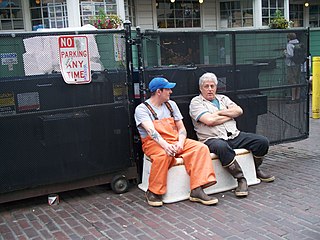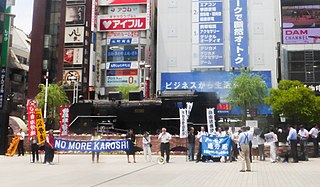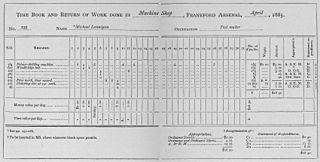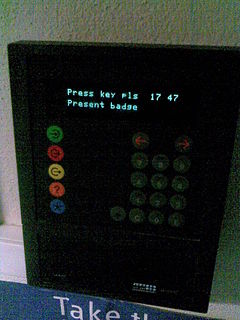 W
WWorking time is the period of time that a person spends at paid labor. Unpaid labor such as personal housework or caring for children or pets is not considered part of the working week.
 W
WThe Bank Holidays Act 1871 established public holidays in addition to those customarily recognised in the United Kingdom.
 W
WBooster Breaks: Improving Employee Health One Break at a Time is a 2010 book. Booster breaks are defined as: "organized, routine work breaks intended to improve physical and psychological health, enhance job satisfaction, and sustain or increase work productivity." Dr. Wendell C. Taylor is recognized as the architect of the Booster Break concept. The intent of Booster Breaks is to encourage health-enhancing breaks during the work day as a corrective to job stress and sedentary behavior. Examples of Booster Breaks are physical activity, meditation, or breath training. Even for brief sessions of 10 to 15 minutes, a routine practice of any of the preceding examples can produce physical, psychological, and/or mental benefits.
 W
WA break at work is a period of time during a shift in which an employee is allowed to take time off from their job. It is a type of downtime. There are different types of breaks, and depending on the length and the employer's policies, the break may or may not be paid.
 W
WBusiness hours are the hours during the day in which business is commonly conducted. Typical business hours vary widely by country. By observing common informal standards for business hours, workers may communicate with each other more easily and find a convenient divide between work life and home life.
 W
WClyde Engineering Co Ltd v Cowburn, is a High Court of Australia case about inconsistency between a Commonwealth and a State law, which is dealt with in s 109 of the Australian Constitution. It contains classic statements of the denial of rights test and the covering the field test for inconsistency.
 W
WA double burden is the workload of people who work to earn money, but who are also responsible for significant amounts of unpaid domestic labor. This phenomenon is also known as the Second Shift as in Arlie Hochschild's book of the same name. In couples where both partners have paid jobs, women often spend significantly more time than men on household chores and caring work, such as childrearing or caring for sick family members. This outcome is determined in large part by traditional gender roles that have been accepted by society over time. Labor market constraints also play a role in determining who does the bulk of unpaid work.
 W
WHot racking is the sanctioned practice within military organizations of assigning more than one crew member to a bed or "rack" to reduce berthing (sleeping) space.
 W
WKaroshi , which can be translated literally as "overwork death", is a Japanese term relating to occupational sudden mortality. The most common medical causes of karoshi deaths are heart attacks or strokes due to stress and a starvation diet. Mental stress from the workplace can also cause karoshi through workers taking their own lives. People who commit suicide due to overwork are called karōjisatsu (過労自殺). The phenomenon of death by overwork is also widespread in other parts of Asia. 745,194 deaths worldwide were attributable to long working hours in 2016, based on WHO/ILO data.
 W
WMoney-rich, time-poor is an expression used to describe groups of people who have relatively little leisure time despite having a high disposable income through well-paid employment. Time poverty has also been coined as a noun for the phenomenon. It arose in Britain at the end of the 20th century.
 W
WIn Abrahamic religions, the Sabbath or Shabbat is a day set aside for rest and worship. According to the Book of Exodus, the Sabbath is a day of rest on the seventh day, commanded by God to be kept as a holy day of rest, as God rested from creation. The practice of observing the Sabbath (Shabbat) originates in the biblical commandment "Remember the sabbath day, to keep it holy".
 W
WSaint Monday is the tradition of absenteeism on a Monday. Saint Tuesday is the less common extension of this to a Tuesday.
 W
WJuliet B. Schor is an economist and Sociology Professor at Boston College. She has studied trends in working time, consumerism, the relationship between work and family, women's issues and economic inequality, and concerns about climate change in the environment. From 2010 to 2017, she studied the sharing economy under a large research project funded by the MacArthur Foundation. She is currently working on a project titled "The Algorithmic Workplace" with a grant from the National Science Foundation.
 W
WShabbat, Shabbos, or the Sabbath, is Judaism's day of rest on the seventh day of the week—i.e., Saturday. On this day, religious Jews remember the biblical stories describing the creation of the heaven and earth in six days and the redemption from slavery and The Exodus from Egypt, and look forward to a future Messianic Age. Since the Jewish religious calendar counts days from sunset to sunset, Shabbat begins in the evening of what on the civil calendar is Friday.
 W
WThe Sunday Trading Act 1994 is an Act of the Parliament of the United Kingdom governing the right of shops in England and Wales to trade on a Sunday. Buying and selling on Sunday had previously been illegal, with exceptions, under the Shops Act 1950.
 W
WThe Sunday Working (Scotland) Act 2003 is an Act of the Parliament of the United Kingdom. The aim of the Act was to close an anomaly in employment law in the United Kingdom, whereby shopworkers in England and Wales had the legal right to refuse to work on a Sunday, when shopworkers in Scotland did not enjoy this right.
 W
WTelecommuting, also called remote working, telework, teleworking, working from home (WFH), mobile work, remote job, work from anywhere (WFA), and flexible workplace, is a work arrangement in which employees do not commute or travel to a central place of work, such as an office building, warehouse, or store.
 W
WA time book is a mostly outdated accounting record, that registered the hours worked by employees in a certain organization in a certain period. These records usually contain names of employees, type of work, hours worked, and sometimes wages paid.
 W
WA time clock, sometimes known as a clock card machine or punch clock or time recorder, is a device that records start and end times for hourly employees at a place of business.
 W
WA timesheet is a method for recording the amount of a worker's time spent on each job. Traditionally a sheet of paper with the data arranged in tabular format, a timesheet is now often a digital document or spreadsheet. The time cards stamped by time clocks can serve as a timesheet or provide the data to fill one. These, too, are now often digital. Timesheets came into use in the 19th century as time books. To record time in a more granular fashion time-tracking software may be used.
 W
WUtopia for Realists: The Case for a Universal Basic Income, Open Borders, and a 15-hour Workweek is a book by Dutch popular historian Rutger Bregman. It was originally written as articles in Dutch for a virtual journal, De Correspondent, and was since compiled and published, and translated into several languages. It offers a critical proposal that it claims is a practical approach to reconstructing modern society to promote a more productive and equitable life based on three core ideas:a universal and unconditional basic income paid to everybody a short working week of fifteen hours open borders worldwide with the free movement of citizens between all states
 W
WWatchkeeping or watchstanding is the assignment of sailors to specific roles on a ship to operate it continuously. These assignments, also known as at sea watches are constantly active as they are considered essential to the safe operation of the vessel and also allow the ship to respond to emergencies and other situations quickly. These watches are divided into work periods to ensure that the roles are always occupied at all times, while those members of the crew who are assigned to work during a watch are known as watchkeepers.
 W
WWork ethic is a belief that work and diligence have a moral benefit and an inherent ability, virtue or value to strengthen character and individual abilities. It is a set of values centered on importance of work and manifested by determination or desire to work hard. Social ingrainment of this value is considered to enhance character through hard work that is respective to an individual's field of work.
 W
WThe Work Less Party (WLP) was a Canadian federal political party that became eligible for registration with Elections Canada on October 1, 2007.